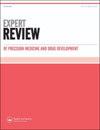Atezolizumab plus vemurafenib and cobimetinib for the treatment of BRAF V600-mutant advanced melanoma: from an hypothetic triplet to an approved regimen
IF 1.2
Q4 PHARMACOLOGY & PHARMACY
Expert Review of Precision Medicine and Drug Development
Pub Date : 2021-09-20
DOI:10.1080/23808993.2021.1976637
引用次数: 0
Abstract
ABSTRACT Introduction Breakthrough changes in melanoma management induced by the introduction of BRAF/MEK inhibitors and immune checkpoint inhibitors (ICPIs) have motivated subsequent research to combine these strategies in the frontline approach of BRAFV600-mutant advanced melanoma. Initial preclinical data have shown that targeted agents may have a favorable immune impact on the tumor microenvironment and next, numerous trials tried to identify the optimal combination and sequence of immunotherapy and targeted therapy. Up until last year, when the first immune/targeted regimen including atezolizumab, vemurafenib and cobimetinib, was approved by the FDA. Areas covered Focusing on this first-in-class immune/targeted regimen, we describe here the entire process for its approval, from the bench of preclinical studies to the clinical evaluation of its efficacy and its toxicity profile on treated patients with advanced BRAF-mutant melanoma. All raised concerns about the use of atezolizumab/vemurafenib/cobimetinib triplet are thoroughly discussed. Expert opinion The atezolizumab/vemurafenib/cobimetinib triplet is an effective frontline option for advanced BRAF-mutant melanoma but its generalized implementation remains limited due to toxicity and cost. Results of ongoing trials are expected to identify more clearly the best candidates for such combinations and to update the role of immune/targeted triplets in melanoma treatment.阿替佐利珠单抗联合维穆拉非尼和科比替尼治疗BRAF V600突变晚期黑色素瘤:从假设的三重方案到批准的方案
摘要简介BRAF/MEK抑制剂和免疫检查点抑制剂(ICPI)的引入引发了黑色素瘤管理的突破性变化,促使随后的研究将这些策略结合到BRAFV600突变晚期黑色素瘤的一线方法中。最初的临床前数据表明,靶向药物可能对肿瘤微环境产生有利的免疫影响,接下来,许多试验试图确定免疫疗法和靶向治疗的最佳组合和顺序。直到去年,包括atezolizumab、vemurafenib和cobimetinib在内的第一个免疫/靶向方案获得了美国食品药品监督管理局的批准。涵盖的领域专注于这一一流的免疫/靶向方案,我们在这里描述了其批准的整个过程,从临床前研究到对其治疗晚期BRAF突变黑色素瘤患者的疗效和毒性的临床评估。对atezolizumab/vemurafenib/cobimetinib三联用药引起的所有关注进行了彻底讨论。专家意见atezolizumab/vemurafenib/cobimetinib三联用药是治疗晚期BRAF突变黑色素瘤的有效一线选择,但由于毒性和成本原因,其广泛应用仍然有限。正在进行的试验结果有望更清楚地确定这种组合的最佳候选者,并更新免疫/靶向三联体在黑色素瘤治疗中的作用。
本文章由计算机程序翻译,如有差异,请以英文原文为准。
求助全文
约1分钟内获得全文
求助全文
来源期刊

Expert Review of Precision Medicine and Drug Development
PHARMACOLOGY & PHARMACY-
CiteScore
2.30
自引率
0.00%
发文量
9
期刊介绍:
Expert Review of Precision Medicine and Drug Development publishes primarily review articles covering the development and clinical application of medicine to be used in a personalized therapy setting; in addition, the journal also publishes original research and commentary-style articles. In an era where medicine is recognizing that a one-size-fits-all approach is not always appropriate, it has become necessary to identify patients responsive to treatments and treat patient populations using a tailored approach. Areas covered include: Development and application of drugs targeted to specific genotypes and populations, as well as advanced diagnostic technologies and significant biomarkers that aid in this. Clinical trials and case studies within personalized therapy and drug development. Screening, prediction and prevention of disease, prediction of adverse events, treatment monitoring, effects of metabolomics and microbiomics on treatment. Secondary population research, genome-wide association studies, disease–gene association studies, personal genome technologies. Ethical and cost–benefit issues, the impact to healthcare and business infrastructure, and regulatory issues.
 求助内容:
求助内容: 应助结果提醒方式:
应助结果提醒方式:


